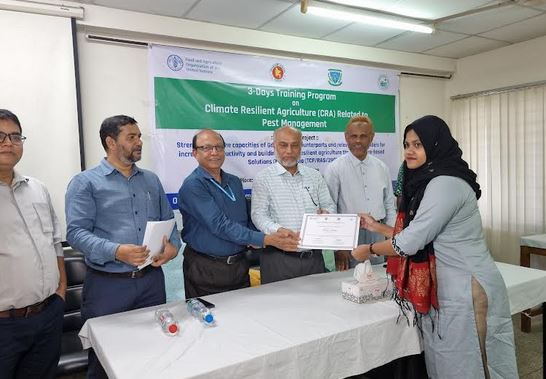News Flash

MYMENSINGH, Oct 14, 2025 (BSS) - The closing ceremony of a three-day training programme on "Climate Resilient Agriculture (CRA) Related to Pest Management" was held today at Bangladesh Agricultural University (BAU) in Mymensingh.
The event, held at 3:00 pm at the Professor Golam Ali Fakir Seed Pathology Centre, concluded with the distribution of certificates among the participants.
Organised by the Department of Entomology, the training was part of the project titled "Strengthening the capacities of Government counterparts and relevant stakeholders for increasing productivity and building climate-resilient agriculture through Nature-based Solutions (NBS) in Asia (TCP/RAS/3907)".
The initiative was supported by the Food and Agriculture Organization of the United Nations (FAO) and the Department of Agricultural Extension (DAE).
BAU Vice-Chancellor Professor Dr. A.K. Fazlul Haque Bhuiyan attended the closing session as the chief guest which was chaired by project leader and Prof of Entomology, Dr. Mohammad Saifullah.
Student Affairs Advisor Professor Dr. Md. Shahidul Haque, FAO National Consultant Prof Dr. Parimal Kanti Biswas, and Prof Dr. Mohammad Ali Hossain of the Department of Plant Pathology were present as special guests.
Speaking on the occasion, BAU VC said climate change has emerged as a major threat to agricultural production systems.
He underscored the importance of science-based training and sustainable, nature-based solutions to address these challenges.
"Those who received the training should help farmers adopt proper pest management practices to ensure pest control measures are safe for human health and the environment," he said, adding that BAU has long been at the forefront of promoting agricultural innovation and farmer-friendly research.
A total of 22 participants, including Sub-Assistant Agriculture Officers, dealers, and students, took part in the programme.
The participants received hands-on instruction on sustainable crop production, nature-based solutions, and pest management strategies in the context of climate change.